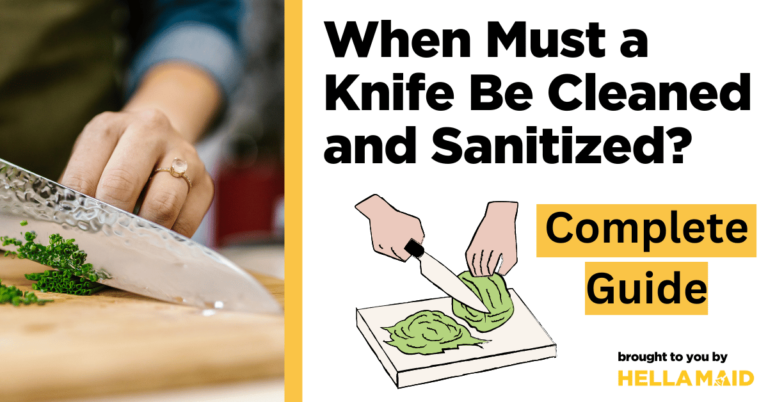“When must a knife be cleaned and sanitized?” This question often needs to be addressed in culinary arts and everyday cooking. However, understanding the importance of properly cleaning and sanitizing knives is crucial for ensuring food safety and maintaining the lifespan of these essential kitchen tools. This comprehensive guide will delve into knife hygiene and explore the specific instances when knives must be cleaned and sanitized. Following the guidelines, you can create a hygienic cooking environment and protect yourself and others from potential health risks.
The After-Use Ritual: Cleaning Knives to Maintain Hygiene
After every use, it is imperative to clean knives promptly to prevent the accumulation of harmful bacteria, food particles, and other contaminants. Here are the specific instances when knives should be cleaned:
After Preparing Raw Meat, Poultry, or Seafood: Bacteria such as Salmonella or E. coli may be present when handling raw animal products. To avoid cross-contamination, clean the knife immediately after use to prevent transferring these bacteria to other ingredients or surfaces.
After Handling Strongly Flavored Ingredients: Ingredients like garlic, onions, or chilli peppers leave strong aromas and flavours on knives. Cleaning them after use ensures that these flavours do not transfer to other ingredients, preserving the integrity of the flavours in your dishes.
After Cutting Fruits and Vegetables: Though fruits and vegetables are generally considered safe, they can still harbour bacteria. Cleaning knives after use helps prevent the transfer of any potential contaminants to other foods.
The Importance of Sanitization: Ensuring Food Safety
While cleaning knives remove visible dirt and contaminants, sanitization is critical in eliminating invisible bacteria and viruses. Consider the following instances when knives should be sanitized:
In a Professional Kitchen Setting: Professional kitchens must adhere to strict food safety regulations. Knives used in these settings should be sanitized regularly to minimize the risk of cross-contamination and foodborne illnesses.
When Handling Allergenic Ingredients: If you are preparing food for individuals with allergies, it is essential to sanitize knives thoroughly to prevent any traces of allergens from transferring to other dishes.
After Exposure to Potentially Hazardous Foods: Certain foods, such as raw eggs or dough, carry a higher risk of bacterial contamination. Sanitizing knives after contact with these ingredients reduces the risk of foodborne illnesses.
Best Practices for Cleaning and Sanitizing Knives
To ensure effective cleaning and sanitization of knives, it is essential to follow best practices. Consider the following guidelines:
Cleaning Techniques:
Rinse knives immediately after use to remove food particles. Use a mild dish soap and a non-abrasive sponge or cloth to wash the knife thoroughly, paying attention to the blade, handle, and crevices. Avoid using abrasive cleaners or steel wool, which can damage the knife’s surface. Dry the knife entirely after washing to prevent bacterial growth and rust.
Sanitization Methods:
Heat Sanitization: Use high-temperature settings on dishwashers or immerse knives in boiling water for at least one minute to effectively sanitize them.
Chemical Sanitization: Follow the manufacturer’s instructions to use sanitizing solutions for kitchen utensils. Rinse knives thoroughly with water after sanitizing.
UV-C Sterilization: When using UV-C light devices, ensure adequate exposure of the entire knife, including the handle and blade, to the light.
Maintenance and Storage:
Properly store knives in designated knife blocks, magnetic strips, or protective sheaths to prevent damage and maintain sharpness. Regularly sharpen knives to ensure their cutting performance. Avoid exposing knives to extreme temperatures or using them on hard surfaces that can cause damage.
Benefits of Cleaning Our Kitchen Knife:
Food Safety:
Regularly cleaning our kitchen knife is essential for food safety. When we prepare meals, our knives come into contact with various ingredients, including raw meat, poultry, fruits, and vegetables. Cleaning the knife after each use helps prevent cross-contamination, reducing the risk of foodborne illnesses.
Removal of Harmful Bacteria:
Kitchen knives can harbour harmful bacteria, such as Salmonella and E. coli, mainly when used on raw animal products. Cleaning the knife effectively removes these bacteria, ensuring they do not transfer to other ingredients or surfaces.
Preservation of Food Quality:
Food residue left on a knife can affect subsequent ingredients’ taste, smell, and appearance. By cleaning the knife thoroughly, we maintain the integrity of flavours in our dishes and avoid any unwanted cross-flavouring.
Extended Lifespan of the Knife:
Regular cleaning and proper maintenance help preserve the quality and longevity of our kitchen knives. Food particles on the blade can corrode the metal, leading to rust and potential damage. By cleaning the knife promptly, we prevent rusting and maintain the sharpness and functionality of the blade.
Hygienic Cooking Environment:
A clean kitchen knife contributes to a hygienic cooking environment. It promotes good sanitation practices and sets a standard for cleanliness in the kitchen. This is particularly important in professional kitchens and food establishments with strict hygiene regulations.
Aesthetically Pleasing:
Cleaning our kitchen knife ensures it remains visually appealing. A clean, shiny blade and handle make for a more pleasant cooking experience and enhance the overall presentation of our culinary creations.
Avoiding Unpleasant Odors:
Knife food residue can generate unpleasant odours over time. Cleaning the knife thoroughly eliminates these odours, creating a more pleasant and inviting kitchen atmosphere.
“When must a knife be cleaned and sanitized?” Understanding the significance of maintaining knife hygiene is crucial for food safety and the longevity of these essential kitchen tools. By promptly cleaning knives after use and implementing proper sanitization methods, you can create a hygienic cooking environment and reduce the risk of foodborne illnesses. Remember to follow the guidelines, establish a routine cleaning and sanitization schedule, and prioritize knife maintenance to enjoy the benefits of clean, sanitized, and well-maintained knives in all your culinary endeavours.




























